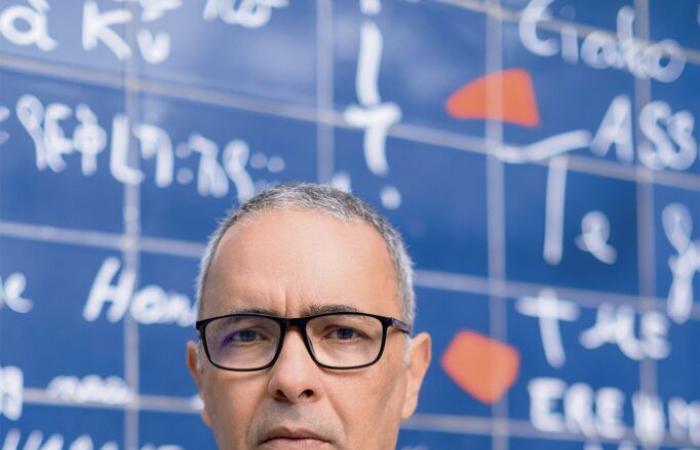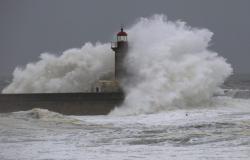The Jewish bookseller of Mostaganem is no longer here to see him. He would have recognized, in the guise of the Goncourt 2024 prize, this teenager who, in the 80s, came to rob his shelves. Kamel Daoud grew up in Misra, a village twelve kilometers away. For him, the bookseller had established a deposit system, like for bottles of milk.
Painting the portrait of this writer that I have known for eleven years means exploring his relationship to the Book and to books. He reminds me of Martin Eden, Jack London's character. The discovery of literature awakened in this “peasant” a vocation as a writer and the desire to control his destiny.
In Mesra, educated in classical Arabic, he is an exception: he also speaks French, and above all, he writes it. This language was passed on to him by his late father, Hamidou, a gendarme trained at the army cadet school.
Fourteen people live under the Daoud roof. Hamidou supports the entire tribe. This silent man was the first in his family to acquire a house. His wife Yamina, still alive, gave birth to six children, of whom Kamel is the eldest.
On two small shelves, the former owners left novels in French. Some of these books are incomplete; Kamel Daoud will reconstitute them over time. He immerses himself in the adventures of the ancient gods “as if it were Paris Match.
The rest after this ad
Writing allows him to live in weightlessness
By dint of having his head immersed in literature, he ends up speaking like a book. And we still have that impression today when we listen to it. At a very young age, he acted as a public writer: he was asked to write love letters.
On occasion, he also acts as a translator, deciphering the dosage of medications for his mother. And he reads to one of his aunts the French subtitles of Hindu films broadcast on television.
His father regularly changing assignments, Kamel and his younger sister were entrusted to their grandparents. He dreams of becoming an cosmonaut. In a sense, he has fulfilled his vocation: writing allows him to live in weightlessness.
His adolescence seems driven by the search for stellar thrills. His quest first takes the religious route. At fourteen, he immersed himself in a rigorous Islam. “It was proto-commitment,” he explains: “you turn to your loved ones, you ask your grandfather not to do this, not to do that, you try to convert your friends to school (…) we avoid certain temptations, we impose discipline on ourselves. »
Inspired by an old mystical method, he places a stone in his mouth so as not to let himself be dispersed by speech. “Childish things,” he sums up. Not Islamism in the current sense of the term. »
The cassettes of Egyptian preachers, broadcast by the Muslim Brotherhood, then circulated. This wave was followed by another coming from Saudi Arabia: Wahhabism. The teenager does not let himself be overwhelmed: “This religious quest had a real philosophical meaning in my eyes,” he confesses. This gives all the more weight to his positions on Islamism, whose literature, rhetoric and way of working.
Science fiction soon reveals to him that there exists “a heaven outside of religion”, a new ecstasy in his life. He devours “2001, A Space Odyssey”, “Unbearable Happiness” by Ira Levin, “Hyperion” by Dan Simmons, everything about Jules Verne. These readings free his imagination.
Today, this Camusian readily defines himself as “pagan”. His paradise is the earth, the trees, the fruits, the vines, the sea. His prayer: siesta, which he considers to be one of the fine arts. We measure a man in war. Or at the table. His personality is fully revealed in front of a plate of sardines from Ghazaouet.
A text marathoner
Another book, “Mémoires d’Hadrien”, by Marguerite Yourcenar, nourishes this pantheism. Thanks to him, he freed himself from the guilty vision of the body instilled by monotheisms. He knows that in the Arab-Muslim world, the woman's body remains the “Gordian knot”: “the incarnation of necessary desire” which makes her “guilty of a terrible crime: life”.
The voice that was to narrate the Algerian civil war of the 90s, in his latest novel “Houris, could only be female. Aube survived an Islamist massacre. But not his vocal cords. It is this flouted, denied body that the writer brings back to life through the force of literature.
I have always been fascinated by this marathon runner of the text, how much, in his words, he engages his flesh. He writes as one speaks on his deathbed, as if it were the last time, but standing up.
As a student, he didn't have a penny in his pocket. Nothing for accommodation. And not enough to eat. In Oran, he knocked on the door of the newspaper “Détective”, specialized in news items. The editor-in-chief orders him a free subject to put him to the test. He returns with an article on the daily life of homosexuals at the faculty.
We hire him. And what's more, he is allowed to sleep in the editorial offices. Three years later, he joined “Quotidien d'Oran”, created in 1994, a regional and then national publication, renowned for its independence. He became one of its star editorialists. Her column, on page 3, is titled ““Raina Raikoum” which can be translated as “Your opinion – our opinion”.
The Daoud tone is revealed, nervous, insolent, caustic, abundant in metaphors. This style stands out in the thousands of columns published to date in the press around the world, and every week, for a decade, in “Le Point”.
At the “Quotidien d'Oran”, civil war suddenly imposes itself on the newspaper's railway, sending the news reporter to the fields of massacre. In January 1998, he found himself in the village of Had Chekala, where nearly a thousand people were murdered in unspeakable conditions by the bearded men.
This experience remains “the most significant” of his life, “ not only because of its horror, but also because of the challenge it imposed on reality. » Moreover, the Algerian authorities have decreed silence on these events. Anyone who mentions it publicly risks a prison sentence. For the moment, “Houris” has not appeared in Algeria.
Power maintains a hemiplegic relationship with memory. He practices hypermnesia regarding the war against France and imposes amnesia on the war between Algerians. Kamel Daoud seeks to lift these two leaden screeds. Since his youth, people have constantly told him how much he is indebted to the glorious independence fighters. Nothing should distract him from the cult of the mujahideen: not even a civil war which probably left more than 200,000 dead.
A quarter of a century later, the writer manages to break this heavy silence with his novel “Houris”: on this shattered past, he was able to compose a coherent and liberating story, which resonates like an incantation.
His editor at Gallimard, Karina Hocine, of Algerian origin, speaks about it with emotion: “Kamel's novel took me back to family discussions. The Dark Decade affected us all in one way or another. “Houris” finally allows us to remember this tragedy. He strikes an intimate story that just needed to come to the surface. »
He wrote this novel while listening to the music from Hans Zimmer's film “Interstellar”. While the earth is dying, astronauts set out in search of a new habitable planet. Has he found his?
For a long time, the biblical figure of Jonah has fascinated him, which he could recount endlessly: “He leaves Nineveh, does not want to obey, embarks on a boat, falls into unconsciousness after being swallowed by a whale. Before that, he is rejected by the sailors who see a curse in him. Finally, he returns to Nineveh… which was saved without him. »
The life of Jonas raises a big question: to leave or to stay? This father of three children, from two marriages, now lives in Paris with his wife, a professor of medicine. French nationality was granted to him in 2020. “I love France and I love my country!”, he tries to explain to all those who urge him to reject the first to prove his attachment to the second.
This is not the least dilemma that this “Southern intellectual” faces. “In the south of the Mediterranean, you are asked to be the intellectual of submission,” he summarizes. In the North, you are called to be a witness for or against Franco-French ideological clashes.” He fights to assert his “I” and free himself from the “We”.
A smear campaign
“Houris” suffered a smear campaign rarely seen in the history of Goncourt. Its publisher Gallimard was excluded from the last Algiers book fair. The writer is accused of being a “Trojan horse”, a “traitor”. “I can think without betraying: it’s quite a work,” he laughs. On his name, we project so many fantasies and passions.
In Algeria, first of all. “The criticism he suffers here comes from the fact that he has never been dubbed by the Algerian circles, hereditary and consanguineous, those of the golden triangle Hydra-Ben Aknoun-El Biar”, deciphers the writer and journalist Adlène Meddi, one of his relatives. Daoud remains the man of Orania, the cradle of Raï, a window on Spain, which occupied it for three centuries.
“In Europe, I am an attack against the discourse of a certain left,” notes Kamel Daoud. These people would like me to pose as a victim of colonialism and say that Islamism is the religion of the oppressed. Well, no! »
In 2016, this “decolonial” left was unleashed against him after two columns he had written in the “New York Times” and in “Le Monde” on mass sexual crimes committed in Cologne, Germany, mainly by refugees. He notably questioned “sexual misery in the Arab-Muslim world, the sick relationship with women, with the body and with desire”
Many in the West confuse him with the character of the brother of Meursault's victim, in “The Stranger”, which he imagined in his previous novel, “Meursault, counter-investigation” (2014). “I can’t play Camus’ Arab,” he quips.
In the same way, he is careful to ensure that his criticism of Islamic totalitarianism does not fuel hate speech. His point goes well beyond that. At a time when identity fever is racing, he carries high the standard of reason and free will.
This liberal spirit cultivates the art of conversation. One of his privileged interlocutors, the female rabbi Delphine Horvilleur, testifies to this. Since the pogrom of October 7, 2023 in Israel, they have become much closer. “That day, my world collapsed,” says the author of “What’s wrong?” » (Grasset). I lost friendships. I was searching for my words. My conversations with Kamel Daoud put me back on the path of life. »
Since their meeting in Algiers in 2017, during an official lunch, the President of the Republic, Emmanuel Macron, has become passionate about the author of “Meursault, counter-investigation”. The two men discovered the same passion for the Argentine writer Jorge Luis Borges, author of the famous “Fictions”, who wrote: “I have always imagined paradise as a kind of library”.
In bookstores, the Daoud section has not finished filling up: the Prix Goncourt will never stop writing. It brings to mind the character in his short story, “The Friend of Athens”, in his collection “The Preface of the Negro”, published in 2008 by his publisher in Algeria, Barzakh. Selected for the Olympic Games, this Algerian 10,000 meter runner does not stop his race after crossing the line. “I remembered that I had come too far to stop here,” Daoud made him say. His reward is not arrival, but “profound independence, detachment. »






